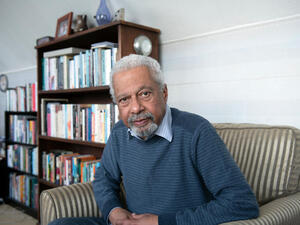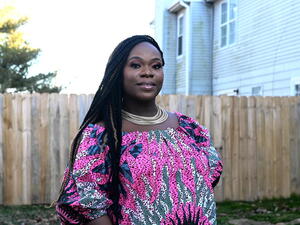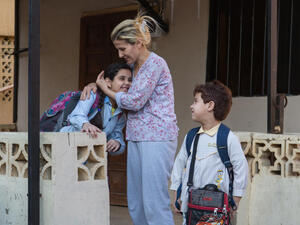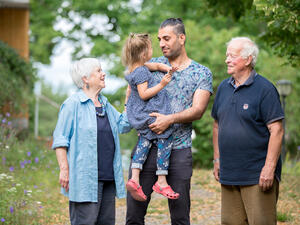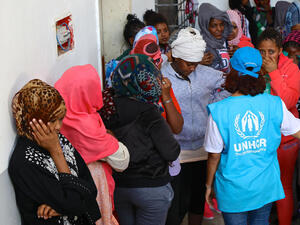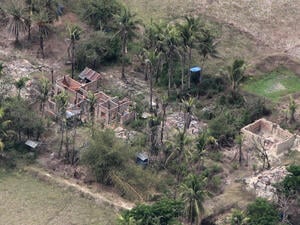A Hand From Celebrities In Support Of Refugees On World Refugee Day
A Hand From Celebrities In Support Of Refugees On World Refugee Day
Malaysian celebrities have come forth to support the refugee cause, in the latest public awareness-raising effort by the UN Refugee Agency (UNHCR) in conjunction with World Refugee Day on 20 June 2012. Five Malaysian celebrities are photographed with refugees, calling for the public to help refugees as they help themselves rebuild their lives.
The Malaysian celebrities involved in the awareness-raising initiative are Miss Universe Malaysia and refugee rights activist Deborah Henry, TV personality Aishah Sinclair, TV anchor and journalist Daphne Iking, entrepreneur and singer Reshmonu, and singer-songwriter Reza Salleh.
They are featured in a series of five posters that carry the central messages of compassion and empathy for refugees who have been forced to flee their countries due to armed conflict and human rights abuses. Each poster appeals for support from the public for these refugees who work tirelessly to help their own communities while they are in Malaysia in areas such as education, livelihoods and healthcare.
These posters will be displayed at the concourse area of Bangsar Village One from Wednesday, 20 June till Sunday, 1 July 2012.
This awareness-raising initiative highlights the many areas where refugees work to help their own communities including in livelihood and education, and the celebrities call on Malaysians to help refugees' own efforts by donating, volunteering their time, or speaking about the issue to others. The campaign aims to mobilise support for refugee-run projects, while creating a positive perception of refugees as empowered and hard-working individuals.
The posters were developed through the pro bono services of advertising agency Leo Burnett Malaysia and photographer Ted Adnan Asmadi.
Aishah Sinclair visited a refugee women’s empowerment centre called Mang Tha, run by a group of refugee women from Myanmar. In the poster, she is photographed with a refugee woman who teaches other refugees how to weave fabric with a traditional loom.
Aishah’s message is “Many refugee women do not have livelihood skills, but are willing to learn so that they can provide for their families. Just do one thing to help them as they help themselves.”
Daphne Iking sits with a group of refugee children of pre-school ages from countries such as Afghanistan, Iraq, Sudan and Iran at a centre called Sahabat Centre. The children are eager for her attention, and she patiently interacts with each one. As a mother, her passion for protecting children’s rights is apparent.
Daphne says “Refugee kids deserve a normal childhood, free of fear. We can help make a safer environment for refugee children to play, and just be children.”
In a cramped classroom of an informal learning centre run by a Myanmar refugee group, Reza Salleh graciously obliges the crowd’s request for a sing-a-long session. Several songs later, he is photographed with refugee children from Myanmar, as he shows the chords to a refugee youth who is eager to learn music.
Reza says in his poster “Refugee youths need to survive in a modern world. If we can do one thing to help refugee youths, give them a chance at a better future.”
Reshmonu visited a refugee family of Rohingya ethnicity, from Myanmar. The family of 13 share a small terrace house, where there is only one main breadwinner in the family. The women are at home when he visits, getting ready for their midday meal. In spite of their difficult circumstances, they are happy to be able to be together and safe.
Reshmonu’s message is “Refugees left their homes because of war and human rights abuses. What they need now is space to rebuild their lives in safety and dignity. Surely we can help them.”
Deborah Henry is no stranger to advocating for the rights of refugees. She helped set up Fugee School in 2009, a learning centre for Somali refugees in Malaysia which recently expanded to include skills-building classes for Somali women also. She is photographed with some of the older students who are learning how to sew so that they can be self-sustaining.
Deborah’s message is “Refugees are not looking for charity. Like us, they do not want to be a burden. Let them work legally, and they can provide for themselves.”


